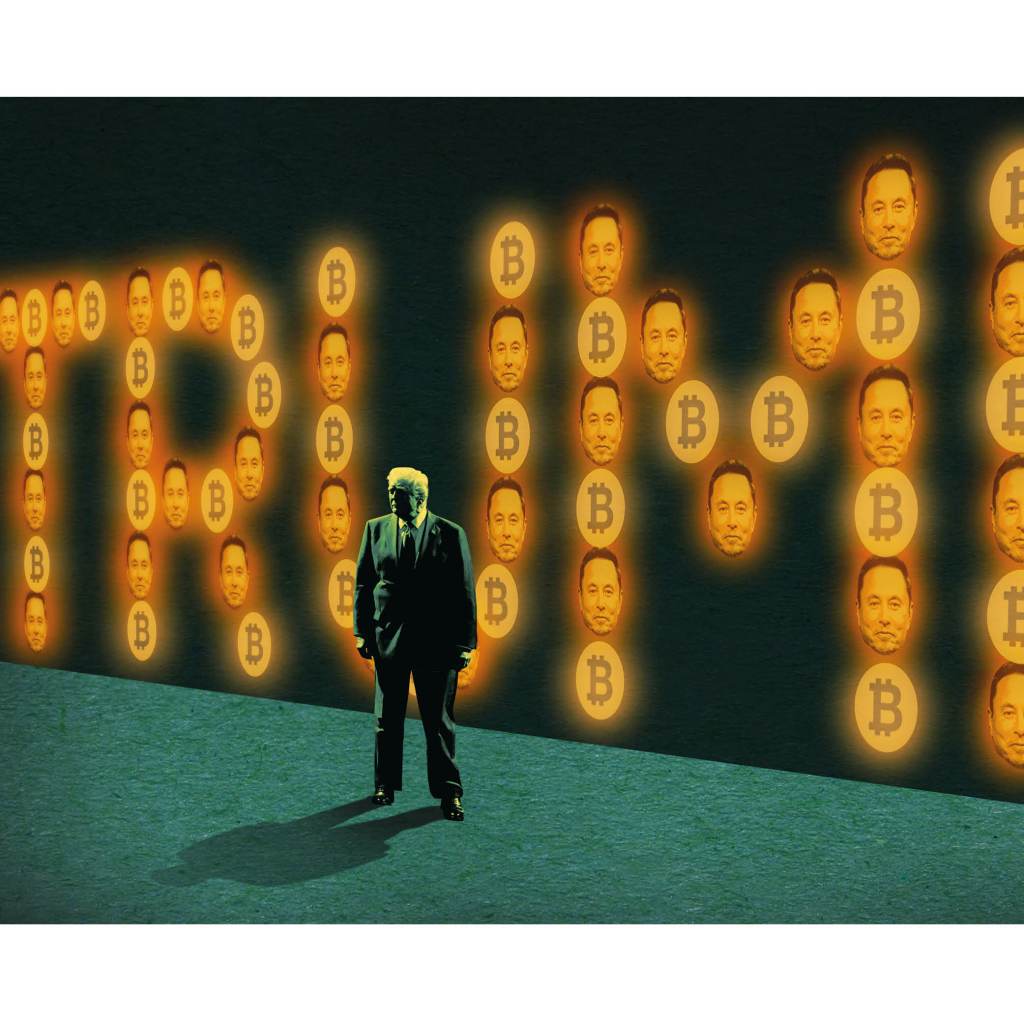Just weeks after Joe Biden’s disastrous debate performance, the July 13 assassination attempt on Donald Trump radically shifted the election calculus yet again. Amid the intense, fast-moving news cycle, one event that would ordinarily have garnered wall-to-wall coverage went nearly unnoticed.
“I fully endorse President Trump and hope for his rapid recovery,” Elon Musk posted to X on the day of the assassination attempt. In recent weeks, a legion of tech giants from the deep-blue stronghold of Silicon Valley have broken ranks and openly pledged support for the MAGA leader.
With each new backer comes a slew of mega-donations to his campaign. In late June, Cameron and Tyler Winklevoss announced their endorsement along with a $1 million donation in bitcoin, each, to the Trump campaign. In late May, Sequoia partner Shaun Maguire announced his endorsement and a $300,000 donation. Earlier in the month, two of the “besties” from the All In podcast — David Sacks and Chamath Palihapitiya — co-hosted a major Trump fundraiser at Sacks’s San Francisco home, raising around $14 million for the Trump campaign. Sacks went on to speak at the Republican National Convention in Milwaukee the week after the shooting.
But around that time, in the days after the assassination attempt and Musk’s endorsement, when it felt as if the tech-for-Trump moment had reached its zenith, another tech-adjacent moment in Trumpworld made the previous ones look incidental by comparison. During the RNC, Trump announced his eagerly anticipated pick for vice president: Ohio senator J.D. Vance. Much topline reporting at the time focused on the fact that Vance is the author of the bestseller Hillbilly Elegy, which rocketed him to fame. But a more important part of his history was far less trumpeted: For nearly a decade after graduating from law school at Yale, Vance worked as a venture capitalist, including at Mithril Capital, founded by the iconoclastic Peter Thiel, a co-founder of PayPal (alongside Musk) and Palantir, and widely regarded as a major shaper of the modern tech industry. Thiel was a $15 million financial supporter of Vance’s Senate campaign in 2022 and, along with Sacks and Palantir’s Jacob Helberg, a forceful advocate of his selection for VP.
While there’s been no shortage of anti-Trump pushback from important tech figures — most vocally from LinkedIn co-founder Reid Hoffman, Sun Microsystems co-founder Vinod Khosla and Mark Cuban, who made his fortune in tech — tech culture and Trumpian politics are evidently having a symbiotic moment. Interviews with prominent industry figures make clear just how significant this kind of political “coming out” is, especially in the Democrat-dominated Bay Area.
“I know of other founders who feel the same as me,” says Eoghan McCabe, the CEO of Intercom, who attended the Sacks-Palihapitiya fundraiser. “But I don’t know how broad the support of Trump is. It’s still taboo. I find tech leaders to be extremely fearful about representing their views openly. But also they tend to be ahead of the curve too.”
According to others, the surge in Trump support from top investors and founders is less about their being pro-Trump and more a protest against Biden’s disastrous business-related policies. “I don’t think people [in tech] are fans of Trump necessarily,” says Alan (not his real name), a tech lawyer and self-identified Democrat who has served as general counsel at several leading companies. “It’s just that the Biden administration is so feckless people are afraid of destroying the economy and losing to China.”
The view that Biden’s more draconian policies would have destructive consequences is one that seems widely held in the industry. “The Biden FTC and other agencies have also been so hostile to tech that it’s hard to see much to like,” says Alan. “This includes Biden’s stupid and reckless proposals on taxation of unrealized gains and carry. It shows a fundamental lack of understanding of how innovation is financed in this country, including how it affects middle-class workers.”
Biden’s administrative regulations and policies, according to this argument, have become so warped by politics that they’ve created an intolerable business environment at a moment when the country is desperately seeking new economic growth. “Silicon Valley powerbrokers, who have historically leaned Democratic in party alignment, are now favoring a Republican who is a convicted felon. Let that sink in,” says Joe McCann, a politically progressive venture capitalist who focuses on crypto.
If tech leaders see Biden policies as untenable, this is especially the case in the world of cryptocurrency, which has seen years of ambiguous policies and aggressive prosecutions by the Biden Department of Justice. Little more than a week after the Winklevoss double-donation, Jesse Powell, co-founder of Kraken, a billion-dollar crypto exchange, announced his endorsement of Trump and a $1 million donation, mostly in ether (ETH).
“For too long, the crypto industry has been under attack by Elizabeth Warren, Gary Gensler and others. Despite overwhelming bipartisan Congressional efforts to put clear rules in place, the Biden White House has stood by and allowed a campaign of unchecked regulation by enforcement,” Powell wrote in a post on X.
Alan, the tech attorney, underlines this point. “Even if Trump’s support for crypto is shallow and obviously manipulative, the Democrats have been so hostile to crypto that it probably won’t take much to get crypto people on side,” he says.
“The Biden administration has made it next to impossible for entrepreneurs and publicly traded companies to run crypto-related businesses. Archaic and nonsensical rules, or lack thereof, have pushed the crypto community toward Trump,” says McCann, the crypto VC.
For younger people in tech, including immigrants drawn to America for its promise of equal opportunity, much of the discontent traces back to DEI. Stefano (not his real name), a young engineer who immigrated from South America to study at MIT, says his collision with San Francisco uprooted the center-left politics he nurtured in college.
“San Francisco, in my view, was in decline [when I arrived in 2018] and it was in a terrible position,” he says. “I had problems with people breaking into our car several times. I saw rampant drug abuse in the streets and how bad the whole state was.
“I also noticed the rise of DEI and [that] the [new trend of] giving a raise and promoting someone based on how they look was normal. I suffered because I grew up in an environment where people are treated equally and was fooled because of the way things are in Silicon Valley.” Stefano, who recently became an American citizen, says his first vote in a US presidential election will be cast for Trump.
Michelle Tandler, a tech founder and executive raised in San Francisco, expressed similar sentiments about her hometown. “I’ve become disillusioned about a lot of leftist policy, having lived and observed what’s going on in San Francisco. It’s especially true regarding schools, crime, drug addiction, homelessness, mental illness, the obsession with identity politics, the lack of openness to new ideas and the blind hatred of conservatives,” she says.
But for Tandler, Biden’s approach to Israel and the war in Gaza was a turning point.
“I think Jews are getting nervous,” she says. “When Biden withheld munitions from Israel a lot of my friends were really worried. Israel is our ally. Hamas is a terrorist organization. We’re supposed to support Israel in this war.”
Eli David, an Israeli AI startup founder with over 650,000 followers on X, believes the shift has less to do with Israel than with cultural politics in America. “I think footage of American flags being torn down and burned on campuses to be replaced by Palestine flags has sent shockwaves through the tech community,” he says. David says that upwards of a dozen founders have reached out to him saying they intend to vote for Trump. “Many founders communicate with me privately saying they changed their mind and will vote for Trump,” he says.
There is little concern that the Bay Area-based tech industry is at any risk of flipping to MAGA. But it’s clear that something is changing — and it’s not slowing down. “I think the shift is real among founder elites, but not yet among the managerial class,” says a well-known tech executive who spent decades working in Silicon Valley. “The people autistic enough to found companies and think for themselves view the past two presidencies as an A/B test — with Trump winning.”
Despite this, some in the industry who strongly support Trump’s business policies take issue with his broader platform. “Trump’s presidency was marked by racism or even perceived racism, which is a non-starter for me,” says Joe McCann, the VC and crypto investor. “So my personal and ideological views of Trump have not changed, but I’m more ‘anti-Biden’ than I am ‘pro-Trump.’ In a vacuum, Trump is clearly a better fit, but we don’t live in a vacuum.”
This article was originally published in The Spectator’s July 2024 World edition.























Leave a Reply